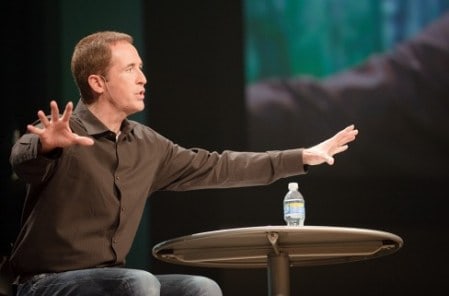 Andy Stanley’s wrap up talk was one of the best of the conference. The topic was not new: work from your strengths. But it was presented with such clarity and in very practical terms. Great, great stuff.
Andy Stanley’s wrap up talk was one of the best of the conference. The topic was not new: work from your strengths. But it was presented with such clarity and in very practical terms. Great, great stuff.
You can watch 3 minutes from a VERY similar talk he gave at Catalyst West right here:
[youtube]http://www.youtube.com/watch?v=GRDHSbICfVk[/youtube]
Here’s my notes from his talk (my favorite points are bolded):
- I had the mistaken idea that great leaders are great at everything
- The other idea I had is what leaders did is when leaders found weaknesses they found ways to shore up their weaknesses
- My fully exploited strengths were a far greater value to our organization than my marginally improved weaknesses
- Your weaknesses will always be weaknesses compared to your strengths
- How to have a great organization — create space for the leaders in your org to fully exploit their strengths and delegate their weaknesses to people who have those strengths
- It’s natural and necessary to set the pace
- So in the early days of org life it’s natural that you do everything
- In the early days there’s no one else to do it
- So we get into the habit of doing things that we really have no business doing
- We accidentally set very low standards for our org b/c we’re doing the best that we can do in areas of weakness
- The best thing you can do for your org is step out of areas that you’re only prettty good at in order to create space for people who are really good at it
- One of the best things you can do is drop a ball and wait for someone to come pick it up
- Someone comes by and says — “someone needs to work on _____.” They are the people to work on that area (not you)
- If we do everything, we never create margin for people to step into leadership
- The less you do, the more you accomplish
- Not taking 30 hour work week
Two of the best kept secrets of Leadership:
- The less you do, the more you accomplish
- (The fewer areas you delve into, the less you focus on — the more you will accomplish)
- The less you do, the more you enable others to accomplish
- Here’s the target: Only do what only you can do
- Instead of doing more and more — you will do fewer and fewer things better and better
When leaders drift from their core competencies, three things happen:
- Their effectiveness diminish — when I do things that I don’t do well, things don’t go well
- The effectiveness of other leaders in the org diminish (When you do things you’re not good at, you interfere with others who are good at it)
- The ability of the org to get and keep great leaders diminishes
- Great leaders want to be set loose and set free to do what God designed them to do
- Your favorite job is where someone else set you up and then just let you go to work
- It won’t even feel like a job to you
- This is such a big deal with us, every time our org grows, my assistant says, “we’ve added this, Andy what do you want to stop doing now?”
- “Now that we are growing, what would you like to stop doing? What do you want to put on your To-Don’t list”.
- I don’t want to give up control, bc I feel I can do better than everyone else
- As the org gets bigger, the only way to sustain growth is to do fewer things better and let other people take on new areas
- It feels like you are going backwards — people won’t think I’m working as hard
Why leaders miss this principle
- Some leaders buy into the myth of being well-rounded
- Tip: Great achievers are not “well-rounded”. They are men and women who play to their strengths and delegate their weaknesses. They have a well-rounded organization
- The greatest leaders you meet are not well-rounded. They have extraordinary strengths and extraordinary weaknesses — that they surround themselves with excellent people
- Leaders forget to distinguish between their authority and their core competencies
- As a leader you will always have authority over areas you don’t know much about
- They either think they need to become an expert or pretend to be an expert
- Why couldn’t they just walk in here and say, wow — you know a lot more about this area then me. I’m going to fuel your expertise and let you run
- That doesn’t mean you don’t ask questions.
- You walk into that area — I may be the authority but I am not the expert. I don’t know as much about this area as my people do
- Tip: Leverage your authority as little as possible. Make as few decisions as possible.
- You wanna raise up leaders? “I’ll let you make this decision” is the key
- I’ll let you decide that. “That’s a good question — I’ll let you guys make that decision”
- You wanna know why great decision makers in your org never surface? You make all the decisions for everyone
- You wanna know who is great at making decisions? — let people make decisions
- Make as few decisions as possible. Do not make a decision unless you must.
- Shove those decision down into the org
- You are training leaders
- You will never know who is a leader unless you make them make decisions
- Let people make some bad decisions (even if it costs you money -Â We didn’t waste money — that’s just money we spent on your development)
- There’s people who work for you who are scared to death to make a mistake
- When people fear for their job, people start hiding info b/c they’re afraid of how you’ll respond
- Some leaders are not able to distinguish between their competencies and their non-competencies.
- Tip: You are not the smartest person in your org. You are just the Leaders.
- This is very impt to know.
- Anyone want to know why I am the leader at Northpoint? I just got there first
- I’m not the best leader. I’m not the smartest.
- We get to be in charge because we started it
- The sooner you are able to discern between your strengths and weaknesses, the better your org is going to be
- If you’re not sure what you’re not good at, ask the people who work for you
- The are all very aware of it and are glad you finally figured it out
- Where I am exercising authority where I am not strong, only average
- Don’t hide behind your weaknesses
- Lean into what God had gifted you in and called you to do
- Some leaders feel guilty delegating their weaknesses
- There are things we need to hand off that we don’t want to do, and I assume nobody wants to do it
- We think everyone is designed like us
- Your weakness is somebody else’s opportunity
- You are robbing someone of an opportunity
- Some leaders don’t take the time to develop other leaders
- We serve a mission that is dependent on leadership multiplication
- We in the church should be the preeminent leadership developers
- One of the reasons you can’t lean into your strengths is because you don’t develop leaders
- Leadership is not primarily about getting things done right
- It’s about getting things done thru other people
- The only way to do that is to allow people around you to do things not exactly the way you would do it
- Acts 6— it would not be right (or it would be wrong) for us to neglect the ministry of God to wait on tables)
- We’re going to do what only we can do (bc we were in the boat with Him, we saw his miracles, we are uniquely equipped to teach the Word)
- Look what Luke tells us happens — the proposal pleased the whole group (the only time in Church history that happened!)
- Suddenly some new names are introduced into the history of the church
- Because suddenly some new opportunities existed because the big 3 leaders stepped aside and focused on core strengths
- What happened — the word of God spread. The numbers increased rapidly
- Would you like the number of Jesus followers in your area to increase rapidly?
- They did less — they accomplished more
- Other names surfaced and the church grew
- Gifts of the spirit — another example of this principle
Here’s the outcome:
- You’ll find it much easier to establish and maintain a sustainable pace
- Tip: Stress in ministry is often related to what you are doing not how much you are doing
- You need to find someone else to do that
- If you keep doing things that are draining your energy, you can’t lead to your maximum capacity
- Organizationally, you will end up with an org that reflects your strengths but not your weaknesses
- The things they brag about Northpoint, Andy has zero involvement in (meeting production, physical building)
- Andy only prepares sermons and casts vision
- The bigger we’ve gotten the fewer things I do
- If you keep a sustainable pace, the more likely your staff will keep a sustainable pace
- God has designed you to be great at something, and the sooner you can figure that out the quicker you will make a greater impact for God
- Do NOT, under any circumstances, try this at home!
- Don’t go home and say: “You know how you say I’m not very touchy-feely and affection, you need to find someone else to do that!”
- At home you better be good at everything
Questions to help you discover your Strengths:
- What do you do that is almost effortless from your perspective, but seem like a daunting task to others?
- In what areas do people consider you the “go to” person?
- What facets of your job energize you?
- What do you wish you could stop doing?
- What organizational environments are you drawn to?
- What environments do you avoid?
- Write an ideal job description for you current area
Dr. Howard Hendricks: “If anything has kept me on track all these tracks, it’s being skewered to the principle of central focus. There are many things I can do, but I have to narrow it down to the one thing I must do. The secret of concentration is elimination.”
